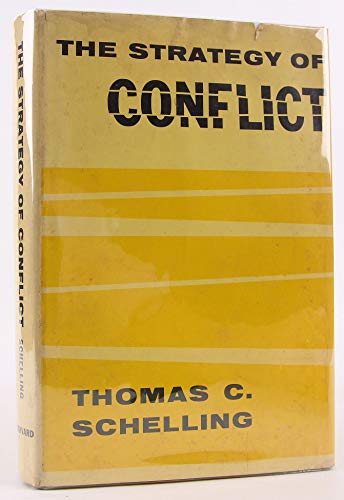
Synopsis
A series of closely interrelated essays on game theory, this book deals with an area in which progress has been least satisfactory--the situations where there is a common interest as well as conflict between adversaries: negotiations, war and threats of war, criminal deterrence, extortion, tacit bargaining. It proposes enlightening similarities between, for instance, maneuvering in limited war and in a traffic jam; deterring the Russians and one's own children; the modern strategy of terror and the ancient institution of hostages.
"synopsis" may belong to another edition of this title.
Review
An important contribution to understanding the conduct of the ambiguous conflict between the communist bloc on the one hand and the United States and its Free World Allies on the other.
In eminently lucid and often charming language, Professor Schelling's work opens to rational analysis a crucial field of politics, the international politics of threat, or as the current term goes, of deterrence. In this field, the author's analysis goes beyond what has been done by earlier writers. It is the best, most incisive, and most stimulating book on the subject.
Against the backdrop of the nuclear arms race in the late 1950s, Thomas Schelling's book "The Strategy of Conflict" set forth his vision of game theory as a unifying framework for the social sciences. Schelling showed that a party can strengthen its position by overtly worsening its own options, that the capability to retaliate can be more useful than the ability to resist an attack, and that uncertain retaliation is more credible and more efficient than certain retaliation. These insights have proven to be of great relevance for conflict resolution and efforts to avoid war. Schelling's work prompted new developments in game theory and accelerated its use and application throughout the social sciences. Notably, his analysis of strategic commitments has explained a wide range of phenomena, from the competitive strategies of firms to the delegation of political decision power.
From the Back Cover
'In eminently lucid and often charming language, Professor Schelling's work opens to rational analysis a crucial field of politics, the international politics of threat, or as the current term goes, of deterrence. In this field, the author's analysis goes beyond what has been done by earlier writers. It is the best, most incisive, and most stimulating book on the subject.'
"About this title" may belong to another edition of this title.
Other Popular Editions of the Same Title
Search results for Strategy of Conflict
Strategy of Conflict;
Seller: books4less (Versandantiquariat Petra Gros GmbH & Co. KG), Welling, Germany
gebundene Ausgabe. Condition: Gut. 4th Edition;. 309 Seiten; Das hier angebotene Buch stammt aus einer teilaufgelösten wissenschaftlichen Bibliothek und trägt die entsprechenden Kennzeichnungen (Rückenschild, Instituts-Stempel.); leichte altersbedingte Anbräunung des Papiers; der Buchzustand ist ansonsten ordentlich und dem Alter entsprechend gut. Einbandkanten sind leicht bestoßen. In ENGLISCHER Sprache. Sprache: Englisch Gewicht in Gramm: 480. Seller Inventory # 1764720
The Strategy of Conflict
Seller: Lost Books, AUSTIN, TX, U.S.A.
Hard cover. Sewn binding. Cloth over boards. 309 p. Contains: Illustrations. Audience: General/trade. Good. No dust jacket. Missing dust jacket. Previous owner's stamp on top textblock edge. Text appears unmarked. Seller Inventory # Alibris.0015631
The Strategy of Conflict
Seller: YESIBOOKSTORE, MIAMI, FL, U.S.A.
hardcover. Condition: As New. Seller Inventory # 0674840305-VB

